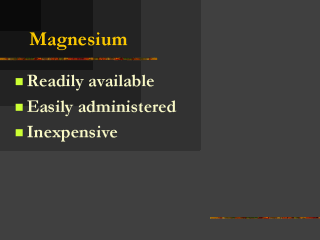| front |1 |2 |3 |4 |5 |6 |7 |8 |9 |10 |11 |review |
 |
The ability of magnesium to minimize the
impact of myocardial ischemia has been shown using intravenous and intracoronary delivery
of magnesium. The timing of magnesium administration is critical in magnesium´s ability
to minimize the insult incurred with myocardial ischemia. Enhancing calcium influx at the time of reperfusion with inotropes, such as isoproterenol, exacerbates myocardial stunning. If inotropes are started late in reperfusion on already stunned myocardium, the expected positive inotropic response is noted. The use of magnesium before surgically induced myocardial ischemia, during, or at the time of myocardial reperfusion appears to improve postischemic mechanical recovery. The accumulated experimental and clinical data on magnesium support the contention that magnesium decreases reperfusion injury, infarct size, the incidence of postoperative arrhythmias, and mortality. Magnesium is readly available, easily administrated, and inexpensive. |